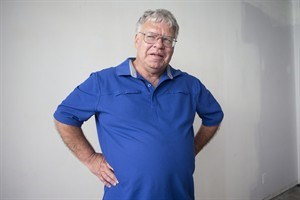
Author Dale Patterson is pictured in Toronto on Thursday, June 20, 2013, as he promotes his book "Fifteen Minutes of Fame: History's One Hit Wonders." THE CANADIAN PRESS/Chris Young
June 25, 2013 - 1:54 PM
TORONTO - American pop artist Andy Warhol's iconic quote "In the future everybody will be world famous for 15 minutes" has inspired a Canadian author to look at the stories of those who briefly entered the spotlight only to fall back into obscurity.
"The stories behind the stories are of interest to me," said Dale Patterson, whose new book "Fifteen Minutes of Fame: History's One Hit Wonders" is just out from Red Deer Press.
Remember Max Yasgur? He's the New York farmer who rented out his field for a small musical gathering and ended up hosting Woodstock in 1969. He died of a heart condition four years later at age 53.
"Rolling Stone gave him an obituary, which is very rare for a non-music person. He was beloved by the Woodstock generation because he gave them a break," Patterson, 60, said in a recent interview.
There are more than 200 entries in the book, and at the end of each, Patterson supplies an additional nugget of information. "If you're into trivia, this is the book for you," he said. "And I've really dug deep to find the trivia."
In the case of the "Rock 'n' Roll Farmer," for instance, Patterson includes the musicians who passed on Woodstock, including Led Zeppelin, the Byrds, the Moody Blues, Jethro Tull, the Doors and Procol Harum.
"I've always been interested in history and the people in history, the actual people and the stories behind the people. ... My favourite thing is what happened after the fame," said Patterson, who hails from Ajax, Ont.
Remember Robert Opel? The photographer and art gallery owner streaked the 1974 Oscars while British actor David Niven was introducing film diva Elizabeth Taylor, who was to hand out the award for best picture.
"During my research I want to find out not just about that but what happened afterwards," said Patterson. "He was murdered five years later in his art gallery in San Francisco. It was a robbery. It was just wrong place, wrong time."
Patterson's previous book was "What Time Of Day Was That?: History by the Minute" (2001), which organizes history according to the time of day it happened. The idea for "Fifteen Minutes" was already percolating after he wrote an entry about Abraham Zapruder, an American manufacturer of women's clothing who became famous for his film using a home-movie camera of the assassination of U.S. president John F. Kennedy in Texas on Nov. 22, 1963.
"That was to me a natural because he was famous accidentally. Because the idea of 15 minutes of fame is to be famous accidentally without anyone trying to be famous," said Patterson, who worked for The Canadian Press news service for 35 years as a reporter-editor.
After his retirement in 2010, Patterson spent about three years doing intense research and writing "Fifteen Minutes."
"Writing to me is like a hobby. It's not work for me. I love writing so much. And I would do it in my spare time. Same way like an artist would be working on a painting, I like writing," said Patterson, who has spent 17 years updating the website Rock Radio Scrapbook, an aircheck archive of Canada's radio history.
"Fifteen Minutes" is the type of book you can have fun dipping into here and there, reading snippets. You'll learn about Tank Man, the unknown protester who, in 1989, stared down a column of tanks in Tiananmen Square; Dolly, the first cloned sheep; and Denise Ann Darvall, whose heart was used in the first human-to-human transplant performed by South African cardiac surgeon Christiaan Barnard after she was badly injured in a car accident.
Then there's the story of Rosie Ruiz, who basked in the winner's spotlight for her 15 minutes at the 1980 Boston Marathon. But it turned out she took the subway en route. When her cheating was revealed, Quebec-born Jacqueline Gareau was recognized as the winner in a special ceremony, "but her win was overshadowed by this woman who cheated. Ruiz wasn't even sweating at the end," Patterson noted.
"If you write history properly it can come alive and be interesting. I'm passionate about history and making it interesting."
News from © The Canadian Press, 2013